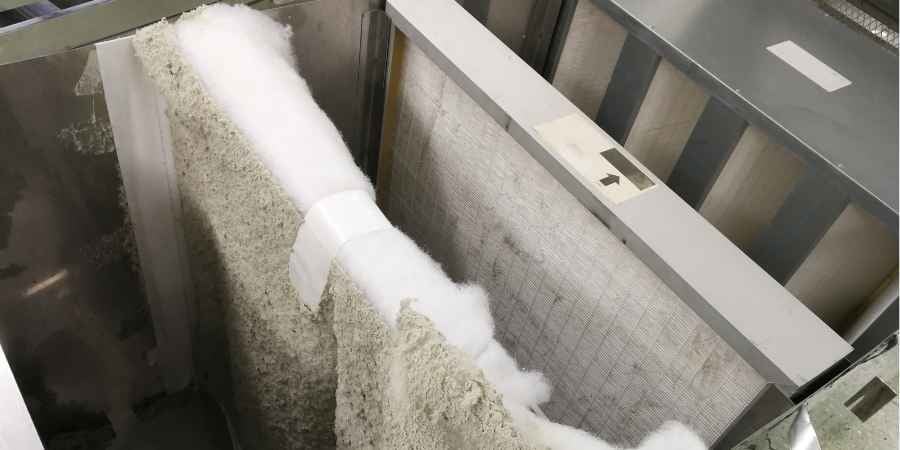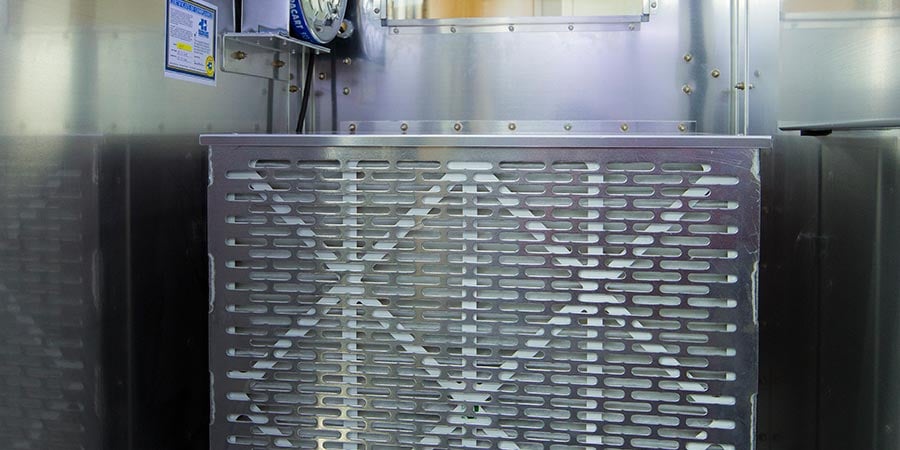Share this
Elevating Indoor Air: The Importance of HEPA H13 Filtration
by HEPACART on Oct 14, 2024

Breathing clean air in your medical facility or school shouldn’t be a luxury. It’s a health and safety necessity, especially during cold and flu season. Efficient air filtration is crucial for maintaining health and safety, but unknowingly choosing the wrong HEPA filter can lead to serious risks in your facility. If your chosen filter isn’t capturing the right particle size, dangerous pathogens like bacteria, viruses, and mold can continue circulating, leading to outbreaks and health issues. The wrong filter type for your facility could mean overpaying for a higher-grade filter than needed and straining your system, while mistakenly believing a lower-quality filter is removing pollutants when you’re it isn’t can leave harmful contaminants like VOCs and allergens in the air. In environments where health is a priority, selecting the correct HEPA filter is essential to safeguard your space.
Ready to learn how to give your indoor air quality a serious upgrade? Let’s dive into the critical distinctions between HEPA H13 and H14 filters and what they mean for your facility.
The Importance of HEPA Filtration
When it comes to protecting the air quality in sensitive environments like hospitals, schools, and laboratories, HEPA filtration is the gold standard. But what exactly is HEPA filtration, and what makes it stand out from other air filters?
What is HEPA Filtration?
HEPA, which stands for High-Efficiency Particulate Air, refers to a filtration system that is capable of capturing at least 99.97% of airborne particles as small as 0.3 microns in diameter. This level of filtration is what defines a true HEPA filter and sets it apart from other filters that may only trap larger particles. HEPA filters are composed of a dense mat of fibers arranged in random patterns that effectively trap contaminants, including dust, pollen, pet dander, mold spores, and even certain bacteria and viruses.
What Makes HEPA Filters Different?
Unlike standard air filters, which are often designed to capture larger particles, HEPA filters excel at capturing microscopic pollutants that are typically harder to remove. Many filters are marketed as “HEPA-like” or “HEPA-type,” but only true HEPA filters undergo rigorous testing to meet stringent industry standards. These other filters may look similar, but they lack the proven efficiency that a genuine HEPA filter provides.
The structure of a HEPA filter is specially designed to capture contaminants in three ways: interception, impaction, and diffusion. This multi-layered approach enables HEPA filters to trap a wider range of particle sizes, making them far more effective than conventional filters.
Why is HEPA the Top Choice for Sensitive Environments?
In environments where air quality is critical — like hospitals, clean rooms, and educational facilities — HEPA filtration is the preferred choice because it offers unmatched protection against airborne contaminants. For people with compromised immune systems, allergies, or respiratory conditions, the enhanced filtration provided by HEPA filters can make a significant difference in maintaining a safe and healthy environment. Additionally, HEPA filters are essential in controlling the spread of infectious diseases, as they effectively trap pathogens that can be transmitted through the air.
Why Your Air Needs a HEPA Filter

HEPA filters offer a powerful defense against indoor air pollutants and are research-backed and rigorously tested to effectively remove harmful particles from the air with industry-leading efficiency. HEPA filters effectively remove odors and volatile organic compounds (VOCs) like benzene and formaldehyde that are common in everyday household items. While these compounds are more common than we may like to think, they can cause irritation, infection, nausea, and cognitive impairment if left unchecked.
By capturing airborne pathogens responsible for illnesses such as the flu and the common cold, HEPA filters reduce the risk of disease transmission, which is particularly important for vulnerable populations like the elderly or immunocompromised. Additionally, HEPA filters can help to enhance sleep quality by eliminating allergens that cause discomfort and respiratory issues. In medical facilities where sleep is a key ingredient for healing, this is a major plus for inpatient care.
HEPA filters also address hidden dangers such as radon, an odorless gas that can seep through structural cracks and contribute to lung cancer, as well as asbestos fibers, once common in construction, which pose severe health risks. Beyond just trapping dust and bacteria, these powerful filters can improve overall well-being by purifying the air from contaminants that standard cleaning cannot.
Understanding “True HEPA” Standards
When it comes to HEPA filtration, it’s important to know the difference between a true HEPA filter and clever marketing jargon. Simply put, a filter is either certified as HEPA or it isn’t — there’s no in-between. Terms like “HEPA-like” or “HEPA-type” might sound convincing, but they don’t meet the same strict standards as genuine HEPA filters. These knockoffs often mimic the look of real HEPA filters without delivering the same level of protection. To truly purify your air, stick with filters that are officially certified on the HEPA rating scale, which we’ll explore further in the next section. At the end of the day, only a certified, “true” HEPA filter can be trusted to deliver the performance you need.
The HEPA Rating Scale
When choosing HEPA filters for your healthcare facility, it’s essential to focus on the ratings that truly make a difference — H12, H13, and H14. While the range spans from H10 to H14, the higher ratings are what you’ll need for maintaining a clean and safe healthcare environment.
- H12 Filters: Capture 99.5% of particles at 0.3 microns. Suitable for non-critical areas but not typically recommended for spaces where air quality directly impacts health outcomes.
- H13 Filters: Capture 99.95% of particles while maintaining good airflow, making them ideal for patient rooms, surgical areas, and labs. H13 offers a solid balance between high-level filtration and efficient ventilation.
- H14 Filters: Capture 99.995% of particles. Best suited for high-risk areas like operating rooms. The denser filter provides top-tier filtration but can restrict airflow, which may not be ideal for all situations.
If you’re looking for reliable air filtration that won’t strain your HVAC system, H13 filters are most often the best and most cost-effective choice. They offer the protection you need while keeping airflow steady, ensuring a safe and comfortable environment for both patients and staff.
The Benefits of H13 and H14 HEPA Filters
In healthcare settings, choosing the right HEPA filter can make all the difference in maintaining clean air. But what exactly is HEPA H13, and how does it stand out from other filters? HEPA H13 filters capture at least 99.95% of particles as small as 0.3 microns, offering a higher level of filtration that’s crucial in environments where air quality directly impacts patient safety. Unlike standard HEPA filters, HEPA H13 strikes a balance between thorough filtration and maintaining the airflow your facility needs. This makes them a solid choice for areas like patient rooms, labs, and offices where consistent air circulation is essential.
The real advantage of HEPA H13 filters lies in their ability to enhance indoor air quality by effectively removing bacteria, allergens, and even certain viruses. In healthcare facilities, this means better infection control and safer air for everyone. Whether you’re using a HEPA H13 air purifier or integrating these filters into your HVAC system, understanding what H13 HEPA filter efficiency offers allows you to make smart decisions that protect both people and your equipment.
Differences Between H13 and H14 Filters
While both H13 and H14 are classified as “medical-grade” filters, understanding the difference between HEPA 13 and HEPA 14 is key to choosing the right option for your needs. Though both offer high levels of filtration, significant differences can make one more suitable for your environment than the other. Let’s break it down.
Comparing Airflow
The biggest difference between HEPA 13 and HEPA 14 filters lies in airflow. H14 filters are denser, which reduces airflow and makes them less ideal for portable air purifiers, as they can restrict the volume of air being filtered. In contrast, H13 filters have a less dense structure, allowing for better airflow while still providing efficient filtration. This makes H13 a more versatile choice for balancing filtration quality with adequate air circulation. However, in scenarios where the airborne particles are both extremely small and highly hazardous, H14’s higher filtration level might be worth the reduced airflow.
Leakage in Filters
H13 filters generally have fewer issues with leakage due to their looser weave, which allows air to move through without creating pressure points that can cause leaks. On the other hand, H14 filters are more prone to leakage because their dense composition can cause air to bypass the filter altogether, reducing overall efficiency.
Filter Efficiency
While H14 filters technically offer higher filtration capability, their potential for leakage can lead to a slightly lower effective efficiency compared to H13. Despite this, the air that does get filtered by an H14 filter is more purified than what passes through an H13. Depending on your facility’s specific needs, either filter could be the better option.
Making the Best Choice: What You Need to Know
While both H13 and H14-rated filters are medical-grade, HEPA H13 tends to be the go-to for balancing top-notch filtration with maintaining proper airflow. H14 filters do offer slightly better filtration but can also restrict airflow, which might not be ideal for every space.
For areas like patient care rooms, labs, offices, and even classrooms where consistent ventilation is crucial, H13 HEPA filters are a more versatile and practical choice. Knowing the difference between HEPA 13 and HEPA 14 helps facility managers make informed decisions, ensuring each area of the facility gets the right level of protection without compromising air circulation. Better yet, you’re able to research and purchase a filtration level that will get you the maximum value for your investment without going overboard and requiring extra maintenance for more powerful filters than you truly need.
The Verdict on High-efficiency HEPA Filtration
Ultimately, the best filtration choice for your facility depends on your specific air quality needs. We consistently recommend HEPA H13 filtration or higher for any environment where health and safety are top priorities.
Whether you add a HEPA H13 air purifier or integrate a HEPA 13 filter into your HVAC system, these filters provide a powerful defense against harmful airborne particles. Understanding the difference between HEPA 13 and HEPA 14 helps ensure that your healthcare facility achieves the ideal balance between clean air and efficient airflow.
Looking to boost your facility with the purifying power of H13 and H14 filters? Unsure about the right kind of filtration for your needs? Whether you’re an air quality expert or just dipping a toe into better filtration, we’ve got you covered with our guide to the best possible air quality. Download your free copy today!

